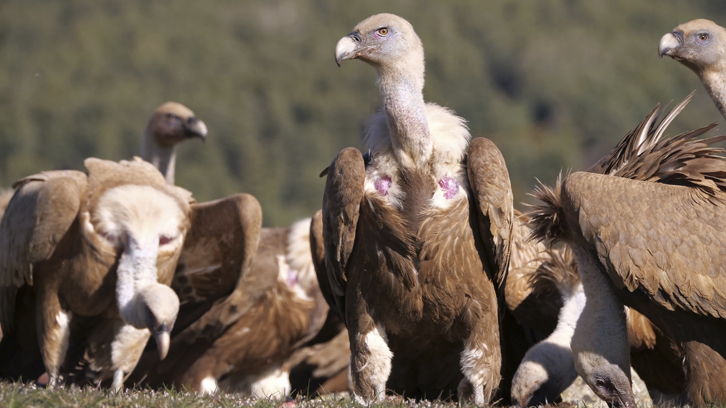Eurasian griffon vultures carry widespread antimicrobial resistant Salmonella and Campylobacter of public health concern

One of the greatest risks to public health is antimicrobial resistance. The occurrence of these resistances has been widely studied in livestock, but not in wildlife. In joint research of the WildCoM group of the UAB Faculty of Veterinary Medicine, IRTA and CReSA, antibiotic resistant bacteria have been discovered in wild Eurasian griffon vultures in Catalonia.
The emergence and spread of antimicrobial resistance (AMR) are one of the greatest threats to public health worldwide. This situation reduces our ability to effectively treat infectious diseases, increases health care costs, and could be responsible for up to 10 million deaths annually worldwide by 2050. AMR is mainly caused by a combination of inappropriate drug prescriptions and use, the widespread use of antimicrobials in animal production and human medicine, and a lack of appropriate drug regulations and surveillance systems in developing countries.
While the occurrence of AMR in livestock has been extensively studied, the role of wild animals in the maintenance and transmission of AMR is poorly understood. Free-ranging wildlife generally does not come into contact with antimicrobials naturally; however, AMR bacteria can be acquired from human and livestock sources such as agricultural facilities and refuse dumps. In that sense, scavenger animals, due to their feeding habits and their position in the food chain, are expected to be more prone to carry AMR bacteria, facilitating their spread and maintenance in the environment.
Spain is home to 90% of the European population of Eurasian griffon vultures (Gyps fulvus). These are avian scavengers that feed on the carcasses of wild and domestic animals. Vultures are particularly exposed to AMR bacteria due to the frequent consumption of infected livestock carcasses in supplementary feeding stations (established to boost their recovery after a critical decline in the ‘80s due to the indiscriminate use of poison) and organic waste in landfills. As a result, they can be potential carriers and spreaders of AMR bacteria.
In this study, we assessed the prevalence and potential anthropogenic origin of Salmonella and Campylobacter, as well as the presence of AMR isolates in a population of griffon vultures from north-eastern Spain. Both bacteria are the leading causes of human gastrointestinal infections in the European Union. We found numerous emergent isolates that are of public health concern, including monophasic Salmonella Typhimurium which is causing a global public health emergency. Genotyping analysis revealed that these strains of monophasic S. Typhimurium were also shared by gulls, livestock, and even humans. Therefore, wild Eurasian griffon vultures in north-eastern Spain are carriers of widespread zoonotic bacteria, which in some instances may have an anthropogenic origin due to their scavenging feeding habits. Concurrently, an important proportion of the isolates of both zoonotic bacteria were resistant to critically important antimicrobials for human medicine, which is worrying. However, more in-depth studies are still needed to understand the potential risk of spill-over from those wild birds to humans.
(1) Wildlife Conservation Medicine Research Group (WildCoM), Facultay of Veterinary Medicine, Universitat Autònoma de Barcelona (UAB)
(2) Joint IRTA-UAB Animal Health Research Unit, Animal Health Research Center (CReSA), Universitat Autònoma de Barcelona (UAB)
(3) IRTA, Animal Health Program, Animal Health Research Center (CReSA), Universitat Autònoma de Barcelona (UAB)
References
Espunyes J, Illera L, Dias-Alves A, Lobato L, Ribas MP, Manzanares A, Ayats T, Marco I, Cerdà-Cuéllar M. Eurasian griffon vultures carry widespread antimicrobial resistant Salmonella and Campylobacter of public health concern. Sci Total Environ. 2022 Oct 20; 844:157189. doi: 10.1016/j.scitotenv.2022.157189

